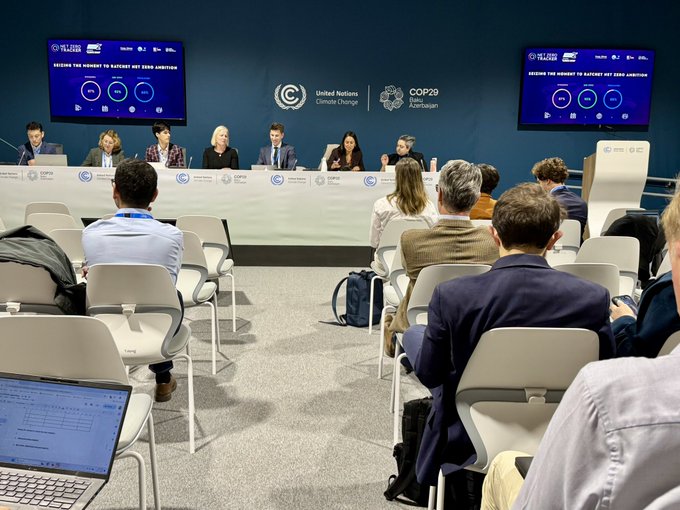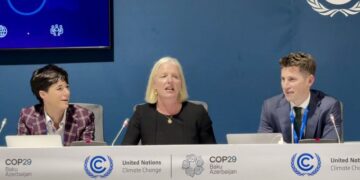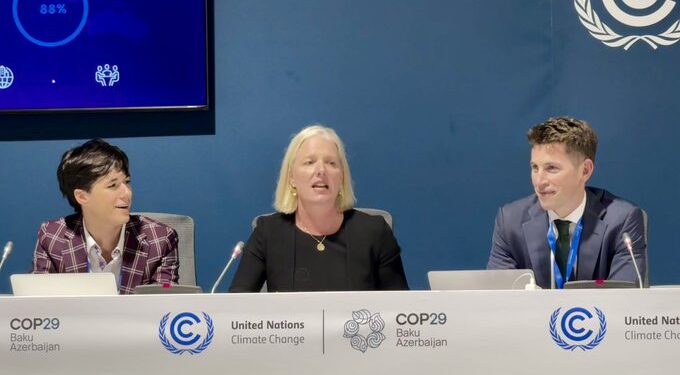November 14, 2024 – Baku, Azerbaijan: Catherine McKenna, Chair of the UN’s High-Level Expert Group (HLEG) on Net-Zero Emissions Commitments of Non-State Actors, delivered her “Integrity Matters: The Hard Work is Now” report to the UN Secretary-General at the COP 29 conference.
This report responds to a request from the UN Secretary-General António Guterres to provide an update on the progress made by businesses, investors, cities, and regions in implementing the recommendations set out in the 2022 Integrity Matters report for credible net zero commitments.
“The leaders highlighted in this review show that high-integrity net zero can be achieved. It’s no longer credible for companies, investors, cities, and regions to claim that moving faster on the climate crisis is too difficult or expensive,” McKenna said.
“However, to meet the 1.5C Paris Agreement target, we need a much broader range of companies, investors, cities, and regions to build on these examples and produce high-integrity transition plans in 2025.”
Many cities, states, and regions are seeing the economic opportunity of the energy transition up close and are moving to capture it. Nearly 100 of the world’s leading cities have developed a climate action plan compatible with the goals of the Paris Agreement in alignment with C40’s Cities Climate Transition Framework.
The report also notes that according to Net Zero Tracker, 1,145 of the largest 2,000 publicly listed companies in the world have voluntary net zero commitments – an increase of 23% since June 2023, with a marked rise in Asia.

However, only a small percentage of those targets and plans are aligned with the criteria set out in Integrity Matters. In particular, the report identifies a severe lack of voluntary commitments to phase out fossil fuels. Phasing out of fossil fuels must underpin all transition plans, along with increased support for efforts to double energy efficiency and triple renewables. Other major gaps in voluntary net zero commitments include a
demonstrated alignment with investment plans, the integration of nature and just transition commitments, and requirements for independent auditing, verification, and assurance.
“Voluntary efforts are not sufficient for the scale and pace of change we need to see,” McKenna said. “We also need governments to step up and regulate net zero pledges to address competitive issues and to provide certainty for investment decisions.” A recent World Business Council on Sustainable Development report on leading companies shows that 90% percent of businesses say they are prepared to invest more if governments implement policies to address sector barriers.
The transition is already moving. Many large companies around the world are already preparing to respond to mandatory climate disclosure regulations in major jurisdictions: the EU’s Corporate Sustainability Reporting Directive (CSRD) will capture approximately 50,000 companies while California’s recent disclosure rules will affect approximately 75% of Fortune 1000 companies.
As countries submit new Nationally Determined Contributions (NDCs) in 2025, more alignment with non-state actors is needed. By driving corporates and sub-national governments to set rigorous net zero targets and plans, countries can boost the credibility of national climate goals. This report echoes a call from UN Secretary-General António Guterres: “Every city, region, industry, financial institution, and company must also be part of the solution. They must present robust transition plans by COP30 next year in Brazil at the latest: Plans aligned with 1.5 degrees, and the recommendations of the UN High-Level Expert Group on Net Zero” the Secretary-General said in his special address “A Moment of Truth”.
McKenna concludes: “Climate change is accelerating and the clean energy transition is inevitable. Businesses, investors, cities, and regions have the tools to act decisively already and they should work with national governments to achieve the Paris Agreement goals. Every fraction of a degree matters and every tonne of CO2 makes a difference. We must do the hard work now, or we will all face the consequences tomorrow.”
The full report can be found here.











